#Winston Churchill critique
Explore tagged Tumblr posts
Text
Human Smoke by Nicholson Baker: A Provocative Examination of World War II and the Case for Pacifism #BookReview #TBRChallenge #bookchatter @Blogchatter #AlternativeHistory
Human Smoke by Nicholson Baker: A Deep Dive into History and Morality Introduction: A Controversial Take on a Tumultuous Era Nicholson Baker’s Human Smoke is a book that has stirred deep emotions, provoked controversy, and challenged many historical narratives since its publication in 2008. At its core, it is a revisionist look at the lead-up to World War II, drawing heavily on a…
#alternative WWII perspectives#documentary-style history#Franklin Roosevelt and Holocaust#Historical Narratives#Human Smoke#Nicholson Baker#pacifism in World War II#pacifist voices in war#war ethics#Winston Churchill critique#World War II revisionism
0 notes
Text
repost: i accidentally just deleted :(
the results of the us presidential election have got me thinking about how the only three female prime ministers in the uk have been absolutely ridiculed and humiliated in the media, even after their deaths. it’s not that i agree with their policies or their political leanings, because i don’t, but where is that same energy with male prime ministers like winston churchill, who not only was a racist alcoholic, but literally was complicit in a famine?? margaret thatcher’s grave has been defiled and people, mostly men of course, casually joke about pissing on her grave and call her a witch. liz truss was turned into a meme in the media and portrayed as unintelligent and out of touch. where was that energy when rishi sunak quite literally borrowed a sainsbury’s worker’s car for a photo shoot to seem ‘relatable’? yes, men are also critiqued in the media but not to the extent these two women were. there isn’t commentary on what the men are wearing or what their hairstyle is, they’re not laughed at for wearing the same outfit more than once. women are villainised in positions of power and the fact that almost 70 million americans would rather vote for a convicted felon, rapist, racist and fraud over a well-qualified, morally centered and ethical candidate, because she is a WOMAN is only the latest proof of that. as someone who won’t be directly affected by the ruling i still think it’s absolutely disgusting and highlights the fact that misogyny is so much more ingrained in our society than anyone gives it credit for being
#radical feminist safe#radical misandrist#radblr#radical feminist community#radfeminism#radical feminism#misandry is valid#proud misandrist#misandry#terfsafe#terfblr#terfism
65 notes
·
View notes
Text
you know spn fandom is categorically unserious bc screenwriter and exec producer ben edlund posted his old brainstorming notes and everyone in the tags is fixated on “dean pretty” as opposed to this quote scrawled in the margin (apparently commonly misattributed to both george orwell and winston churchill):
“people sleep peacefully in their beds only because rough men stand ready to do violence on their behalf.”
hello. hello. big heaping spoonful of critique fodder open up
#crack open the head of the average spn viewer and its just dean action hero montage and tumbleweeds#also dean and cas standing vaguely next to each other with hearts scribbled around them in crayon#I’m being MEAN again. I need to sleep to shut myself up
21 notes
·
View notes
Note
hey, could you go into more detail with what you mean with ‘being precious’ with characters. im curious and i like your writing a lot <3
i think it's difficult to express without it reading as just "mary sue" critique, you know. tvtropes bullshit. but it is kind of a thing that occupies the same space. and atop that, it's a thing that's a little bit difficult to express without context but i think there are three pretty meaningful examples of a character being made worse by the author from which you are smart enough to discern what i mean
the thing which ties them together is this: you are meant to come out of their story with an affection for the character that rivals the author's care for them - the author wants you to feel as much for this character as they do, but is afraid of portraying the character in flawed or even grounded ways, when the character's flaws or ways in which they are a grounded character tend to be what makes them relateable or worth caring about.
example number one is albus dumbledore. the end of harry potter is genuinely one of the worst things i've ever read, even before the terf shit, and this is best expressed through the way characters around him act - he is always right, except when he's wrong, but the ways in which he's wrong are okay because the character archetype that he turns out to be in the last book before he dies is "guy who makes the hard decisions because nobody else will", winston churchill guy. and naturally, jk rowling adores him so much that she made him the protagonist of her flop three-movie pentology even though there was a better protagonist right there with newt. he is a character who is thoroughly adored by the author in a way that ruins the story.
example number two is johnny, from the room. tommy wiseau is by no means a great artist, but i think a lot of people resent analyzing the room as art because it is so obviously bad and i think that takes away from its most compelling fact. johnny is characterized as too good for this world, as though the world itself was closing in on him, ready to take him out. his future wife is cheating with his best friend, lying about him being an abuser to her friends, his boss doesnt give him his promotion for no reason, his mother in law would put aside her cancer diagnosis to further tear apart her daughters marriage, and through this, johnny does nothing wrong. he was always too good for this sinful world. he is a character who is thoroughly adored by the author in a way that ruins the story.
example number three, as mentioned in that last ask, is lin manuel miranda's portrayal of alexander hamilton, which kind of combines the both of the previous examples. throughout hamilton, alexander hamilton is repeatedly portrayed as a tortured artist, a guy who writes like he's running out of time, a guy whose writing is so powerful that he could have meaningfully changed the world, if he were not also, a dipshit idiot who got shot in a duel. and hamilton is interesting, because the story itself bends over backwards to imagine new outs for him. when his wife, who is so upset by his actions that she exempts herself from being in the writings from which hamilton was based, something i am to believe is made up whole cloth for hamilton, the story itself goes out of its way to say "what if the stuff that his wife destroyed would have redeemed him" when the answer is, probably not, he was a shithead, but lin manuel miranda can't help but ask, "what if hamilton was actually just like me fr, a misunderstood dude who just wanted to make great art", he is a character who is thoroughly adored by the author in a way that ruins the story.
i dont really want to use the term "mary sue" or whatever because it is pretty loaded, and honestly, if the story you're telling justifies this feeling, i tend to really enjoy characters who really are just flawless, characters who the authors love and want you to love too. but theyre character studies - half blood prince and deathly hallows are almost entirely about dumbledore and his relationship to the cast, and it's the worst shit i've ever read. the room would be so unbelievably forgettable without johnny. and hamilton is hamilton.
and its the kind of thing i found myself prone to doing too - that kind of feverish, "he would not fucking say that" behavior about a character who would definitely, absolutely do that. i felt this way for a while about jane in post-canon, and i still kind of think post-canon jane deserved a better arc, to make a tragedy out of her existence, but that is a desire i have because i care a lot about jane crocker, you know?
14 notes
·
View notes
Text
Skyfall is a good movie. Frankly, all the Daniel Craig bond films leading up to it were good movies. Pivoting from the 06 Casino Royale’s re-contextualization of spies in the post-9/11 geopolitical landscape, Skyfall is about the consequences of the wars we fought before and the mistakes that came back to haunt us following the actions we took in those wars.
Skyfall was released in 2012, 11 years after the twin towers fell and 9 years after the 03 invasion of Iraq. We’d killed Bin Laden and now had to deal with ISIL, who’d not yet bombed the Ariana Grande concert but had at this point grown in power as a result of the US invasion in 03. Setting up the villain of the film (and his horrific disfigurement) as directly the result of MI6 decisionmaking only for him to come back and blow up MI6′s iconic HQ is evidence enough that Skyfall is a retrospective on a decade of war on terror that seems to have done nothing.
There are no better ways to show how tired and old Bond (and the empire he represents) is than to have him fail his fitness tests while in Winston Churchill’s old bunker. A waning icon of a waning empire in the decrepit remains of said empire. It’s a perfect exploration of the intersection of postcolonialism and the war on terror.
Given that the last Daniel Craig film I’d seen before starting Skyfall was Glass Onion, I watched Skyfall with the “I’m so glad that Craig stopped playing Bond so that now he can dress in sweaters in fun movies” criticisms in mind and frankly, I found they fell flat. For one thing, Bond does wear sweaters in this (very fun!) movie (as well as a cute blue adidas tracksuit with matching shoes!), but on top of that I’m starting to realize this criticism of the modern bond franchise (and other films like these) comes from the sort of people who still use the word “grimdark” for their media criticism. Just like those who unironically use “dudebro,” their contributions to serious discussion are limited. Doubly so for Skyfall because this movie is fantastic and balances tone elegantly.
I will admit that Skyfall takes a serious tone when addressing things like “the fall of the 20th century western imperialist old guard” and “thematic explorations of the war on terror and the mistakes of those gambling with the lives of millions” (If you were to try and write those into something finally similar to Trolls 2 it’d be difficult though not impossible) but I will argue that the movie is still self aware enough to understand itself as a pulpy adventure film.
This isn’t Moonraker or anything, but Skyfall is self aware enough to know what beats to hit. The villain monologues and then challenges Bond to a flintlock pistol shooting match. They keep the main bad guy in a dorky sci-fi glass prison cell. The action finale has goons (did I mention that there are goons?) showing up in a helicopter to attack a castle. They even pull the old DB5 out of mothballs so Bond can threaten the ejection seat trick. Bond fights off an evil lizard in a casino at one point. Imagine the movie in 60s Technicolor and the bones of the plot are just as camp as Goldfinger.
The movie is clearly self-aware and plays into the campier story conventions of a genre the franchise it belongs to basically started. It just doesn’t have characters shrug and go “*gulp* he’s behind me isn’t he?” Instead of lampshading the more ridiculous aspects of pulp characters from the 60s and 70s, Skyfall is so darn earnest about how cool these are. It’s self aware yet charming in its seriousness! (Jots down “James Bond Skyfall = Solarpunk?” into margin of notebook and is never heard from again)
Movies like Captain Marvel can’t say the same, and only half of that is because you can’t write a critique of Bush and Obama era imperialism while also shilling for the USAF. It’s because they can’t be serious in their ridiculousness that they end up being less campy (ashamed of truly trying) and less adult (too silly to take seriously) and ultimately less fun than movies like Skyfall.
That’s ultimately what Skyfall is. A Pulpy country-hopping spy flick about modern spies operating in shadows that are getting more cynical with every conflict. It’s not Dr. No but it’s immense fun that explores themes few other franchises are tackling these days. That’s worth a lot more than whatever Ryan Reynolds/The Rock spy film is dealing these days. And Daniel Craig got to wear a dark powder blue tracksuit too.
38 notes
·
View notes
Text

Roger Mais "Now We Know,” Public Opinion. 11 July 1944. in Impossible Objects. "NOW WE KNOW" by ROGER MAIS
This 1944 critique of Winston Churchill’s imperialist ideology, “Now We Know,” brought Mais to court and he was sentenced to six months in prison for sedition.
4 notes
·
View notes
Text
And like seriously I don’t blame you if you liked them as kids (or even a tweenie!) Adolescents are not expected to be able to do political critique on the books they read. I liked TERRY GOODKIND until like the eighty book, okay? I’m not judging you.
But her politics are very much evident and clear from JUST HER BOOKS, putting aside her activism
Dumbledore is literally “what if Winston Churchill but make him a closeted gay guy with a hard-on for Hitler”
Hermione is a strawman feminist who is repeatedly ridiculed for trying to campaign for emancipation and equal rights and making an organization with a stupid acronym.
The goblins are an antisemitic caricature—yes, the movies made it even worse with gheir physical choices, but seriously. JKR had a separate race of people who are physically shorter and uglier than humans, have had a history of antagonism/oppression, their own language/script, are obsessed with money, and control the banking system. It was there to begin with.
Rita Skeeter.
SNAPE
and don’t even get me started on Galbraith
it's really disappointing how people's critique of jkr starts and ends with her transphobia, and they completely ignore her blatant antisemitism, racism, homophobia, slavery apologism, sympathy for the wizard nazis, (the wizard nazi incel) snape's redemption, the villain of fantastic beasts trying to stop the holocaust, and the new game literally being a rehash of the blood libel myth.
72K notes
·
View notes
Text
One vague fear about Complete Unknown Like most who have seen the trailer for Timmy’s next knock out performance, I am almost giddy about the new film. My only lingering concern is that the script and treatment might not meet the standard of our boy’s performance. The Rolling Stone article on Complete Unknown apparently shares my angst a little bit since they closed the article with the interviewer saying something like “ Since Dylan managed to get himself involved in the production we can assume that it will not be all true.” To which Mangold, the film’s writer and director simply smiled and said “we’ll let that be your quote.” Since I tend to fret about such stuff, could some of you please take a moment to reassure me that fan possessiveness about the legend of Bob Dylan will not affect the critical or box office success of Complete Unknown?? I’ve read Dylan fanatics’ critiques of Timmy and sense there will be more stringent evaluations of his performance as Dylan than Rami Malek, Gary Oldham, or Renee Zellweger got for their Oscar winning performances as Freddy Mercury, Winston Churchill, or Judy Garland. Maybe the safest way to Oscar-land is to portray dead people? Can you tell I am aching for Timmy’s talent to be acclaimed by his peers?
1 note
·
View note
Text

10-356 Ne pas se fâcher
L'adresse est :https://soundcloud.com/jlgaillard/ne-pas-se-facher
À la Chambre des Communes, en Angleterre, le Premier ministre Winston Churchill avait été l'objet de virulentes critiques. Son visage écarlate témoignait de son état de colère quand il prit la parole pour répliquer à ses contradicteurs. Mais à la surprise générale, son discours fut un modèle de brièveté :
« Je rappellerai, dit-il, un vieux proverbe : celui qui ne sait pas se fâcher est un sot, mais celui qui ne veut pas se fâcher est un sage ! »
Ce n'est pas un proverbe biblique, mais il peut nous aider à réfléchir. Quoi qu'il en soit, Churchill avait fait le choix de l'apaisement.
Il fut un temps où on pouvait lire un autocollant « Ne nous fâchons pas »sur la glace arrière des autos. Une mention qui serait encore bien utile ! Récemment, un automobiliste irrité par une dangereuse manœuvre effectuée par un autre conducteur, sur une aire de stationnement, sortit son fusil et tua à bout portant l'autre chauffeur.
La Bible donne des conseils de sagesse :
« Ne t'irrite pas contre ceux qui font le mal [...] Ne t'irrite pas contre celui qui réussit dans ses voies, contre l'homme qui accomplit de mauvais desseins [...] Ne t'irrite pas, ce serait mal faire. » Psaumes 37 : 1 et 8-9.
Tout accès de colère, d'irritation, de fâcherie, de brouille, de mésentente ne doit pas avoir cours chez le vrai chrétien. Et si nous y avons cédé, demandons-en pardon à Dieu et à la personne contre laquelle nous nous sommes irrités.
La réconciliation et la paix que Dieu veut mettre en notre cœur sont à ce prix, comme ainsi que l'authenticité de notre témoignage chrétien.
#chambreDesCommunes #angleterre #PremierCinistre #WinstonChurchill #churchill #discours #proverbe #sage #sagesse #réflexion #réfléchir #méditer #fâcher #nenousfachonspas #colère #irriter #automobile #chauffeur #conseils #bible #paix #chretien #reconciliation #dieu #versetdujour #versetbiblique #histoire
0 notes
Text
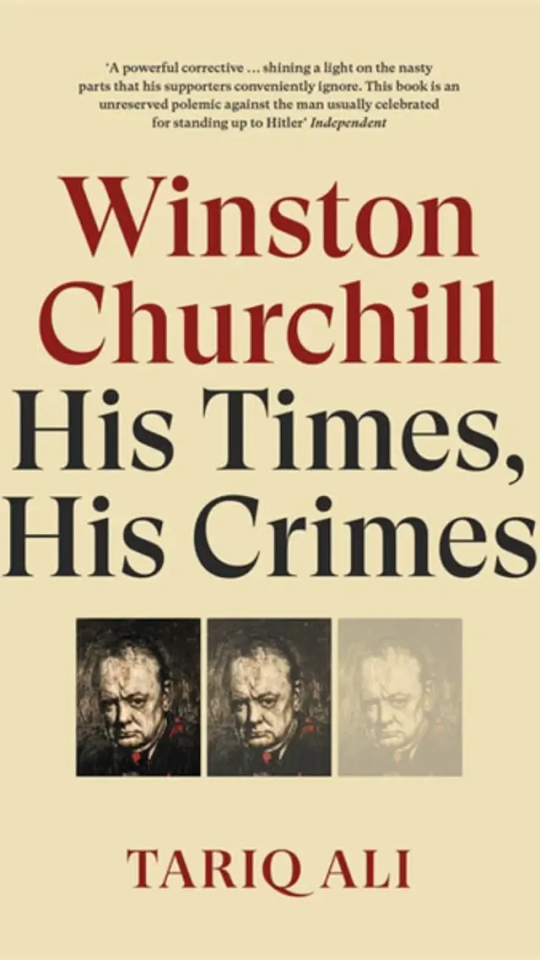
Tariq Ali's "Churchill: His Times, His Crimes" delves into the complex persona of one of Britain's most celebrated figures, Winston Churchill. Ali, known for his sharp analysis and unapologetic critique of historical figures, provides a refreshing and critical perspective on Churchill's life and legacy.
Ali's work challenges the conventional narrative surrounding Churchill, which often portrays him as a hero of World War II and a champion of democracy. Instead, Ali meticulously examines Churchill's actions and policies, exposing the darker aspects of his leadership.
One of the most compelling aspects of Ali's analysis is his exploration of Churchill's imperialist tendencies. Ali highlights his role in perpetuating British colonialism and his ruthless suppression of anti-imperialist movements, particularly in India and Africa. Ali argues that Churchill's policies directly contributed to the suffering and oppression of millions of people across the British Empire.
Moreover, Ali scrutinizes Churchill's attitudes towards race and ethnicity, revealing deeply ingrained prejudices and racism that manifested in his policies and rhetoric. By contextualizing Churchill's views within the broader framework of colonialism and racism, Ali offers a nuanced understanding of the man behind the myth.
Ali's writing is both engaging and thought-provoking, weaving together historical analysis with intelligent commentary. He skillfully deconstructs Churchill's persona, forcing readers to confront uncomfortable truths about one of history's most revered figures.
While some readers may find Ali's critique of Churchill unsettling, his work serves as a necessary reminder of the complexities of history. The biography is a compelling and timely exploration of one of history's most influential figures. Tariq Ali's unflinching critique forces readers to confront the contradictions and complexities of Churchill's legacy, making this book essential reading for anyone interested in understanding the true impact of Britain's wartime leader.
About Imperial Stout:
Imperial Stout beer is a bold and robust style known for its intense flavors and high alcohol content. Originating in 18th-century England, it was brewed to withstand long journeys to the Russian Imperial Court, hence the name. Furthermore, Churchill’s legacy is tainted with his imperialist perspective, racism and crimes. So it is fitting that the producer (Frontaal, Breda) of this beer linked Churchill with a imperial stout (11%)
This beer boasts a rich, dark color with notes of roasted malts, chocolate, coffee, and sometimes even hints of dark fruits. Its full-bodied texture and high alcohol by volume (ABV) create a warming sensation, making it perfect for sipping on cold nights. With its deep complexity and often luxurious mouthfeel, Imperial Stout remains a favorite among craft beer enthusiasts seeking intense and flavorful experiences.
Further reading, listening and watching:
Ali, Churchill: His Times, His Crimes. 2022, Verso Books.
0 notes
Text
CLARA HASKIL - PRÉLUDE ET FUGUE
Au théâtre du Rond Point jusqu’au 26 mars

« Cette maturité d’un cerveau d’enfant est véritablement angoissante ! » Charlie Chaplin disait : « Parmi mes amis, j’ai pu côtoyer trois génies : le professeur Einstein, Winston Churchill, et Clara Haskil. » Ce soir, veille de concert, Clara Haskil vient de faire une chute dans un escalier mécanique de la gare de Bruxelles. La pianiste, au sommet de sa gloire en 1960, voit alors la maison de son enfance dans l’incendie, à Bucarest. Elle voit son oncle qui la conduit à sept ans à Vienne puis à Paris. Elle voit les deux guerres, entend la solitude, sent la maladie, sourit à ses amis et à la musique.
Auteur, scénariste belge, prix de la Critique, prix Théâtre de la SACD, Serge Kribus convoque les œuvres de Mozart, Schumann ou Scarlatti, jouées en direct sur scène, dans un texte ciselé. Il fait entendre les voix de l’enfant, de l’artiste accomplie et de son entourage, dans un portrait poétique, une partition minutieuse.
0 notes
Note
Listen, I might be playing the devils advocate, but I don't think Dany's fate in the GoT finale was due to D&D being sexist.I think it was just because D&D can't write for crap.
It’s not about intent.
Allow me to begin by saying that I completely understand the knee-jerk reaction that people have to the term ‘sexism’. It’s very polarizing, and when men read the term, they immediately go on the offensive. That’s not what I want at all. I don’t use the term to alienate or exclude men, I use it because it’s the dictionary definition of what I’m trying to convey:
sex·ism (noun): "prejudice, stereotyping, or discrimination, typically against women, on the basis of sex.“
That said, allow me to play devil’s advocate here and say that I do not believe the writers intended to have an underlying sexist message. They are more oblivious than they are malicious. It is born of sheer ignorance (lack of knowledge or information) and the privilege to ignore it because, as males, it doesn’t affect them.
Let’s put aside the dozens of articles that came out after the finale calling out the sexism. You guys know me, I like to pull receipts, cite my sources, and throw in some visuals to help aid my point.
For most of the 70+ hours of Game of Thrones, Daenerys actually does not fall victim to these sexist tropes. Honestly, that is what subverted my expectations for seven seasons. That Dany always teetered on the edge of these tired, overused tropes about women, yet she remained steadfast in her ruthless yet good nature, her moral compass was always aligned even if it didn’t match the viewers, and she was a gods-damned hero, straight through to episode four of season eight.
But the demoralizing reality is that Daenerys was hit with trope after trope in the last three episodes. In the final hours of the show, the writers pulled a bait-and-switch, giving us a ‘shocking’ heel-tern whose only foreshadowing was a very bad retcon job full of double standards. And so many fans, such as yourself, justify it. Not because the show foreshadowed it, but because these tropes are so, so ingrained in our brains from decades of media feeding us these narratives that we now expect them.
In the end, Daenerys succumbs to numerous sexist tropes:
'God Save Us From the Queen’ trope
“The Good Kingdom: A lovely, wealthy country ruled by a benevolent king, a wise prince, and a fair princess loved by the populace. But what’s that? There’s a queen? Oh, brother, we’re in trouble.”
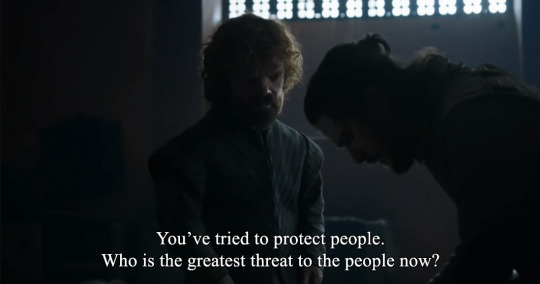
Disposable Woman trope
“This character has a familial or romantic relationship with a protagonist, which allows creators to derive heart-wrenching sorrow from her death.”

Evil Infertile Woman trope
“Women are often divided into "breeders” and “the barren,” with the latter coming off as cool and distant at best, and malicious and desperate at worst.“
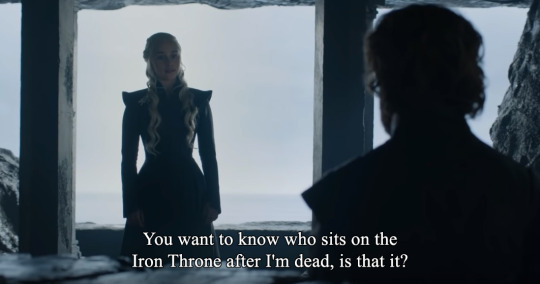
The Double-Standard Trope
"A double standard occurs when members of two or more groups are treated differently regarding the same thing. Gender is one of the most common causes of double standards.”

Hysterical Woman trope
“This trope characterizes women as less rational, disciplined, and emotionally stable than men, and thus more prone to mood swings, irrational overreactions, and mental illness.”

Woman Scorned trope
“What’s the only type of woman more dangerous than a Mama Bear? A woman who’s been dumped or otherwise done wrong by her significant other. Especially if she’s been hiding some sanity problems.”
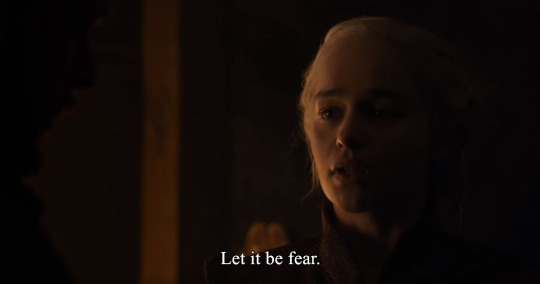
Women Are Delicate trope
“Even if women have toughness, competence, strength or stability, it’s less than what their male peers are capable of.”
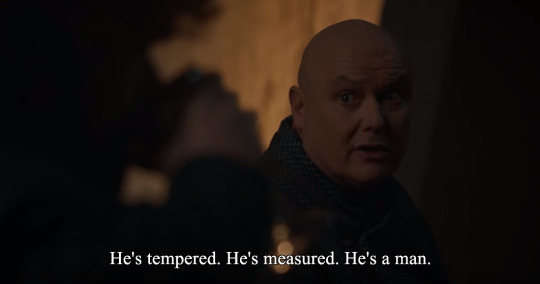
The Woman Wearing the Queenly Mask trope
“They don’t want a young woman, or they don’t want any woman, or they just don’t want this particular woman on the throne.”
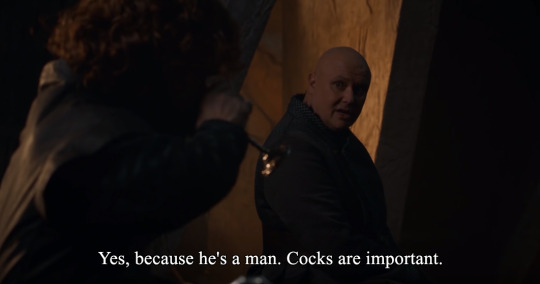
Tropes in and of themselves are not bad, but very outdated tropes that are associated with the emotional or mental ‘fragility’ of women are. Why? Because they reinforce deep-seated and subconscious stereotypes of women that audiences hold.
“It’s just a show/book! Who cares!”
People have been turning to art (including literature) for years for meaning, for philosophical guidance. Most people in my own country turn to one book to both find and justify their morality (the bible).
“Literature offers not just a window into the culture of diverse regions, but also the society, the politics; it’s the only place where we can keep track of ideas.”―Reza Aslan
It’s not just a show. The art and media we consume helps shape who we are, for better or worse. When men refuse to consider the consequence of their sexist narratives simply because it doesn’t affect their own lives, it inadvertently causes harm for others who don’t share their privilege.
And it’s not just Daenerys. She’s just the figurehead.
There was a great article from BBC about how much women actually speak on Game of Thrones:
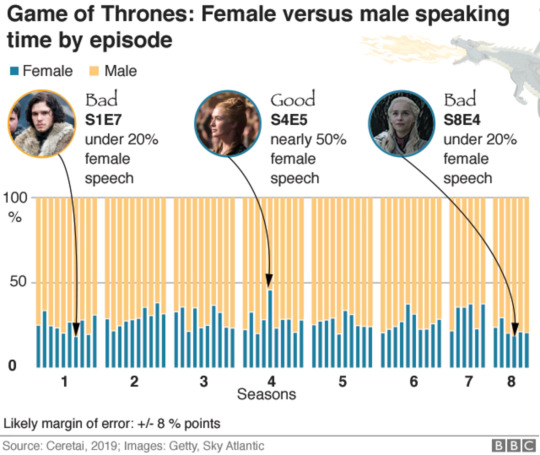
I can already hear the counter-argument brewing…
“So what? There are more male characters!”
Yeah. There are. And that’s a problem, too.
Of the top-grossing 1,200 films from 2007 to 2018, 28% of films were led or co-led by women. Meanwhile, around 49.6 percent of the world’s population is female.
By featuring so few women and by giving women who are featured 20% of the airtime to speak their minds, the writers are unintentionally devaluing the speech and opinions of women. This inspires the audience to devalue women in a subconscious way.
Whether or not it intended to, Game of Thrones and its shocking 'heel-turn’ has very troubling sexist and political implications (amongst other things).
Go ahead, tell me I’m wrong. Tell me I’m blowing this way out of proportion.
Tell me it’s just a show or a book and every single fan knows how to separate fiction from reality (they don’t, go look at Maisie William’s Instagram comments following her season eight sex scene for proof of that). Meanwhile, here in actual reality, we see things like this:
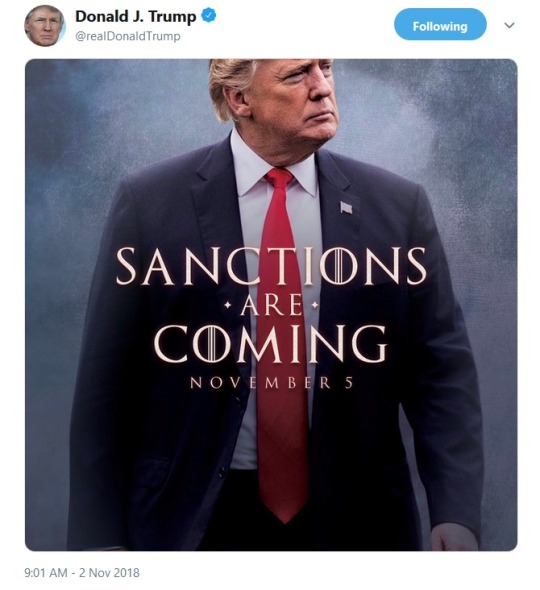
@thescarletgarden1990 informs me that over in Italy, political figures are using Game of Thrones advertising in their campaigns, too:
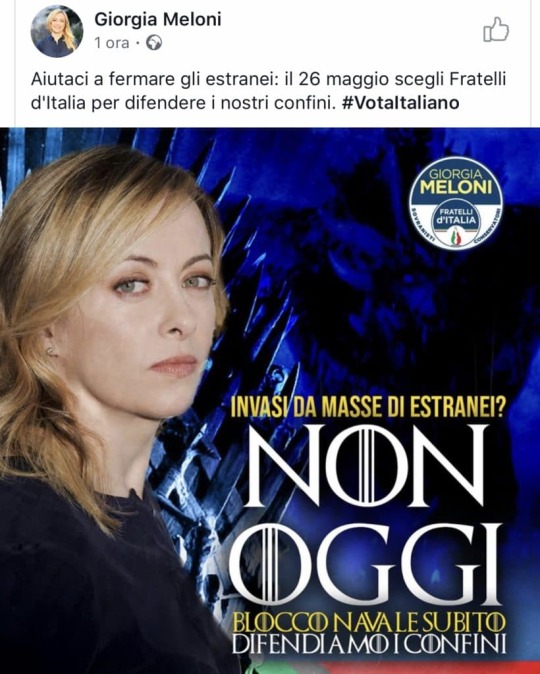
Translation: “Invaded by masses of Others? Not Today. Immediate naval block, let’s defend our borders.”
What makes it worse is that, at least Donald Trump, identifies with House Stark. Or, those who rule the northerners. The people who showed their blatant racism toward the only two black named characters. And the writers never bothered to critique the problematic behavior, instead, rewarding their people with independence and driving those pesky evil foreigners ’back where they belong’.
I’ve barely had time to scroll my dash and I’ve already seen a troubling amount of harassment towards Dany fans via anon asks (including myself, though I just block the IP and delete but I wish I’d saved them for proof).
Why? Because the ending justifies their personal narrative, this bad writing confirms their worldview. Meanwhile, on the other side of the spectrum, the same thing is happening in reverse in response to the takedown of a figure like Daenerys Targaryen:
“Khaleesi’s heel turn is particularly troubling for fans who might have felt a true sense of connection to her character following her epic story arc, which has seen Dany escape some awful circumstances to literally walk through fire, free the slaves, bring Dragons to the north and help rally the troops to defeat the Night King. She has basically been Abraham Lincoln, Hercules and Winston Churchill combined into one person riding a dragon.” (x)
The point here is that the show is doing its audience of 19,300,000 viewers a great disservice by succumbing to very outdated tropes and double standards, and sending troubling messages as a result. For instance, a woman can do countless heroic or selfless things, but you should never trust her! She needs to be tempered. Women cannot wield power responsibly. There are endless messages you can take away from this ending and the dialogue that led us to the show’s conclusion (my personal favorite being ‘Cocks are important’).
And the fans who want to say 'you’re overreacting’ to everyone who speaks up against it are only aiding in this ongoing legacy of 85% male writers who get to tell our stories, poorly, and reap all the rewards.
Sure, all of this could be solely the result of ‘just bad writing’…
Nevertheless, it is what it is.
#answered#anti got#anti d&d#daenerys targaryen#daenerys defense squad#game of thrones#got#season 8#sexism#i have a boatload of asks i will get to later eep!
4K notes
·
View notes
Text
BLOODY HELL, Murdoch
As you could probably guess, I am a lover of historical dramas, with Murdoch Mysteries being one of my absolute favourites for both its' encapsulating storyline and for being Canadian. When it comes to historical dramas, a lot of times myself along with other historians are known for being very critical in regards to subject matter, costumes, location, even the way characters speak and interact with eachother in these types of shows and films. In my professional opinion, Murdoch Mysteries is probably one of the better series when it comes to both telling a fictional but period (1890s onward) narrative and showing both the progressivism of the early 1900s and the many problems faced in this era.
The show takes place in the bustling metropolis of Toronto Ontario, and as you could have guessed focuses on crimes of murder that occur in the city. Detective William Murdoch works out of station house number 4 and is the Toronto constabulary's best super sleuth. Armed with the assistance of the magnificent coroner Doctor Julia Odgen, his chipper Constable George Crabtree, and his quick tempered Stationmaster Thomas Brackenreid, Murdoch solves any and all mysteries presented to him.
The show is not only entertaining, its' characters are also wonderful representations of both traditional values and changing times. Thomas Brackenreid, a martyr of the old generation often finds himself falling victim to stereotypes of the times such as discriminating against different ethic groups and also refusing to accept new emerging technologies. In contrast, characters such as Doctor Julia Odgen and Constable George Crabtree offer modern ways of thinking. Julia is both a working professional in a male dominated field, obtained an abortion, and is an advocate for birth control and women's rights, all of which of course are seen as taboo for a woman. George Crabtree is often regarded as a simpleton or a day dreamer for his love of modern inventions and trends such as: pizza, hamburgers, Coca-Cola, and of course his insistence on the existence of vampires. George also is critiqued for investing in modern technologies which the rest of the station, including Murdoch finds obsolete. The show also challenges gender and race discrimination by hosting female coroners, one of which being of colour, and another being a homosexual.
Aside from all of the innovation, the show also presents common problems associated with life in the early 1900s. Poverty, lack of hygiene, ethnic and racial segregation and discrimination are all present in the show. The suspects also come from all social classes and are distinguished by their appearance. Lower classes are presented with yellowed teeth and tattered clothes, middle are often cleaner but usually don the same outfit as they may only have two or three, and upper class are presented as being quite bourgeoisie. The difference in language used also indicates social class in the show, with the upper class being more posh and proper and the lower using slang. The show also shows how the police often used racial and ethic discrimination when it came to solving murders and crimes, often assigning blame without full motive. Murdoch of course always steps in and obtains the truth, and attempts to discourage arrests on the basis of ethnicity.
The show however does sometimes become outlandish, Murdoch often finds himself in the company of many historical figures such as Winston Churchill, Henry Ford, Sir Arthur Cohan Doyle, and of course Nikola Tesla. Usually when he works with these individuals, a new innovation is created such as audio recordings. Now of course it is entirely unlikely and even impossible that these people would have ever stepped foot in Toronto let alone desired to work with the police force. However this component of the show also helps push the idea of innovation and progression in both police practices as well as thinking.
Overall, is the show a perfect representation of the Toronto police force in the 1890s- early 1900s? Absolutely not. But no show should be. If it were, the show would have no entertainment value whatsoever. The show is able to both progress as history progresses but also shows how hard life was in the time it is depicting. Its' use of costumes, coloqualisms, and historical context provides a concrete and believable set for a riveting and complex story line.
Murdoch Mysteries will always have a special place in my heart.
Until next time,
The Historic Heathen
5 notes
·
View notes
Text
SYSTEMATIC LIVING IN DENIAL
Winston lovers only have one thing... "But but Hilter, bro..." "But but tribal rituals bro.."
BUT FACTUALLY...
While those in the West would not want to admit it, for obvious reasons, Winston Churchill was a racist of the highest order. He told the Palestine Royal Commission in 1937, “I do not admit… that a great wrong has been done to the Red Indians of America or the black people of Australia… by the fact that a stronger race, a higher-grade race… has come in and taken its place.”
However, the most racist, infamous of the deeds of Winston Churchill concern his actions which directly culminated into the Bengal Famine in the 1940s. His actions, which involved exporting rice out of India even as Bengal was struggling with famine, directly contributed to the death of an estimated 3 million people.
The United Kingdom also adopted a ‘denial policy’ in India which involved confiscating great quantities of rice and thousands of boats so as to prevent the Japanese from having adequate resources should they invade India in the future. He was warned repeatedly that continuing to export rice out of India could result in food shortages in the country, however, Britain continued exporting rice out of India to elsewhere in the world to sustain its war efforts.
When the Indian Viceroy requested for 1 million tonnes of emergency wheat supply in 1942-43 on account of the famine, Winston Churchill blamed the famine on the fertility rates of the Indians. He said, “I hate Indians. They are a beastly people with a beastly religion. The famine was their own fault for breeding like rabbits.”
Shashi Tharoor, who for reasons unknown to us, is the only Congress leader allowed to speak his mind, has critiqued the British hero in the harshest of words. At an event for the launch of his book, Tharoor said of Winston Churchill, “This is the man who the British insist on hailing as some apostle of freedom and democracy. When to my mind he is really one of the more evil rulers of the 20th century only fit to stand in the company of the likes of Hitler, Mao and Stalin”.
“Not only did the British pursue its own policy of not helping the victims of this famine which was created by their policies. Churchill persisted in exporting grain to Europe, not to feed actual ‘Sturdy Tommies’, to use his phrase, but add to the buffer stocks that were being piled up in the event of a future invasion of Greece and Yugoslavia”.
“Ships laden with wheat were coming in from Australia docking in Calcutta and were instructed by Churchill not to disembark their cargo but sail on to Europe,” he added. “And when conscience-stricken British officials wrote to the Prime Minister in London pointing out that his policies were causing needless loss of life all he could do was write peevishly in the margin of the report, ‘Why hasn’t Gandhi died yet?'”
As a consequence of the actions of Winston Churchill, millions were starved to death in India during the Bengal famine and the resultant spread of diseases such as malaria and cholera. There was great social disruption which changed the landscape of Bengal completely. Thus, considering all of this and his statements, it is an indisputable fact that Winston Churchill was indeed a racist and claiming that he wasn’t is sheer denial.
A contemporary source cited in Historian Sugata Bose’s paper on the matter described Bengal in those days in the following words: “Bengal is a vast cremation ground, a meeting place for ghosts and evil spirits, a land so overrun by dogs, jackals and vultures that it makes one wonder whether the Bengalis arc really alive or have become ghosts from some distant epoch. And yet in the imaginative words of the poet, golden Bengal was once ‘well-watered, fruitful, abundant with crops.'���
The death toll was so high that the disposal of the corpses became a matter of grave concern. Sanitation plummeted and people had no clothes to wear either. Women committed suicide because they had no clothes to protect their dignity. Some came out of their rooms only when it was their turn to wear a single piece of clothing that was to be shared by all the women in a family.
It was one of the darkest phases of the History of Bengal. And this dark phase was fuelled by the evil policies of Winston Churchill that were a consequence of the hatred he bore towards Indians. Therefore, to claim that he was not racist just because he opposed Adolf Hitler is to remain in denial of the obvious. An opposition towards Nazi Germany is not a sufficient condition to declare someone a hero. Stalin killed million as well and yet, no sensible person denies that he was a genocidal maniac.
14 notes
·
View notes
Text

On June 16, 1933, President Franklin Delano Roosevelt made a statement in celebration of the passage of the National Industrial Recovery Act (NIRA). The historic legislation sanctioned many of Roosevelt's most ambitious proposals to tackle the Great Depression, including the creation of the Public Works Administration (PWA). NIRA, which would be rendered defunct by judicial mandate just two years later, is perhaps best noted for being the first federal minimum wage scheme.
Through the legislation, the newly-created National Recovery Administration (NRA) was given the mandate to establish minimum wage rates through cooperation with private firms. Five years later, Roosevelt would sign the Fair Labor Standards Act of 1938, thereby creating the first standardized federal minimum wage. Roosevelt did not mince words when speaking about why he supported minimum wage laws. In Roosevelt's own words, "[i]t seems to me to be equally plain that no business which depends for existence on paying less than living wages to its workers has any right to continue in this country." Roosevelt additionally clarified that "...by living wages[,] I mean more than a bare subsistence level– I mean the wages of decent living."
Roosevelt's reason for supporting and presiding over the creation of a federal minimum wage was clear: The minimum wage was intended to allow all workers to achieve a decent standard of living. Roosevelt added, in equally explicit terms, the goal of the federal minimum wage as created by NIRA was to transform workers' "starvation wages and starvation employment [in]to living wages and sustained employment". The demand for minimum wage laws to improve workers' livelihoods had become common throughout much of the international labor movement decades prior to the passage of NIRA. These campaigns shared a common goal: Rectifying the fact that far too many workers were being paid too little to lead a decent livelihood.
The first modern minimum wage law was enacted in New Zealand as part of the Industrial Conciliation and Arbitration Act of 1894, passed primarily to curb further labor agitation in response to the 1890 maritime strike. The legislation created an arbitration court to set minimum wages in various industries to guarantee decent standards of living for workers in said sectors. As economist M.B. Hammond noted in The Regulation of Wages in New Zealand (1917), through the legislation, "it would be the duty of the Court to see that the minimum wage established by the Court was high enough to enable the worker to maintain a decent standard of living."
The passage of the legislation was followed across the Ditch two years later in Australia, with the colony of Victoria implementing the Victorian Factories and Shops Act in 1896. The legislation created wages boards especially to tackle rampant poverty among "sweated workers", whose measly wages prevented them from leading decent standards of living. This monumental victory had reverberations across the world, inspiring similar efforts in the United States and Europe. In 1909, the Parliament of the United Kingdom passed the Trade Boards Act, intended to guarantee workers in industries notorious for low wages a living wage. Speaking in favor of the act, Winston Churchill MP, then a young Liberal, stated that "[i]t is a serious national evil that any class of His Majesty's subjects should receive less than a living wage in return for their utmost exertions."
In the United States, groups like the National Consumers League (NCL) led the push for state-level minimum wage legislation during the 1910s. Early minimum wage campaigns were intrinsically linked with the women's rights movement, with feminist leaders identifying minimum wage laws as a means to curb poverty among working women, who invariably received lower wages than their male counterparts. Notable advocates of minimum wage laws in this period include future Social Security Board member Molly Dewson and iconic social reformer Florence Kelley, the latter of whom played a major role in Massachusetts's early adoption of the minimum wage.
Speaking on the need for minimum wage laws, the NCL stated that "the interests of the community demand that all workers shall receive fair living wages, and that goods shall be produced under sanitary conditions". By 1923, Massachusetts had been joined by fourteen other states as well as the District of Columbia in passing minimum wage laws. These state-level laws, along with other progressive labor legislation, would find itself a target of the judicial activism of the Lochner-era Supreme Court.
There is no ambiguity surrounding the reasoning behind the Roosevelt Administration and earlier advocates' support for minimum wage laws. The purpose of minimum wage legislation was to guarantee that workers, be it from select industries or across-the-board, would be paid well enough to afford a decent livelihood. Given that the federal minimum wage was created to be a living wage, one would expect that any suggestion to the contrary would be met with universal derision. Unfortunately, the false claim that the minimum wage was never intended to be a living wage remains a popular conservative talking point.
The prevalence of this talking point is especially bizarre given that it does not even make sense at face value. What, exactly would be the purpose of laws mandating a minimum if not to prevent employers from paying their workers too little to live on? Despite the absurdity of this claim, PragerU, a hard-right propaganda front originally propped up by petroleum tycoons, had the gall to say say that a "minimum wage, by definition, is not supposed to be a living wage". In a thinly-veiled dig at food service workers, "[h]uman beings are designed to learn, to grow, and to become capable adults. Entry-level jobs help provide that initial opportunity."
It's tempting to respond to this claim by noting that minimum wage jobs are anything but the exclusive domain of teenagers. International conglomerates like McDonalds do not hire cashiers and kitchen workers as some kind of charity measure to allow young people to gain experience to "become capable adults". Fast food giants hire these workers because their businesses would necessarily not be able to survive without their labor, an extremely basic concept that conservatives who claim economic expertise have somehow not been able to figure out.
But doing so, even if necessary, feels wrong, because PragerU and similar mouthpieces are not arguing in good faith. This is not an instance of misunderstanding the history of minimum wage campaigns, but a deliberate lie to antagonize and devalue food workers. Providing proof that minimum wage jobs are not the exclusive domain of high school students is futile because conservatives do not care about the welfare of older workers, either.
When conservatives dismiss the necessity of providing food service workers with a living wage, they are not doing so because they feel the jobs they perform are obsolete. After all, anyone who regularly purchases prepared food is aware of the need for workers to cook and serve meals. On the contrary, they fully understand the necessity of these jobs, they're just more than willing to let those who perform them suffer in poverty.
Despite Americans' famous disregard for the welfare of "burger flippers"—this hateful moniker persists, even after the "essential worker" label became ubiquitous during the COVID-19 pandemic—it's clear that President Joe Biden's $15 federal minimum wage initiative has a popular mandate. When Seattle instituted a $15 minimum wage in 2014, the policy was denounced as radical, a self-inflicted wound that would surely sabotage the city's rapid growth. The tireless effort of organized labor, progressive politicians, and the clear success of the policy where it has been implemented has led to the policy being embraced by both the Democratic Party and the public at-large.
Though the leftist critique that a $15 minimum wage was insufficient as a means to eradicate poverty among workers in 2014 and is even less effective seven years later has merit, perspective is needed here. More than doubling the federal minimum wage will surely transform countless lives for the better, and it's entirely consistent to recognize this while also supporting campaigns for future increases to the minimum wage. Raising the federal minimum wage to $15 an hour will not single-handedly fulfill the initial goal of minimum wage laws—ensuring that all workers will be paid enough money to live on—but if implemented will be a huge step towards it.

1 note
·
View note
Text
Timeline
Without further ado the timeline of our site! The consequences of the events that follow play a big part in the subplots that will also be released soon.
January 10, 1931: Edward meets Wallis Simpson at a house party. She’s married to her second husband Ernest, after divorcing Earl Winfield Spencer. The pair next meet again five months later.
August 1934: Edward arranges a cruise along the Spanish and Portuguese coasts. Wallis is present, but tellingly her husband Ernest is not.
November 1934: Edward introduces Wallis to his mother at a Buckingham Palace bash. King George V refuses to meet her.
January 20, 1936: Edward becomes king.
August 1936: The monarch is pictured on holiday with Wallis in the American and continental press.
November 16, 1936: Edward tells Prime minister Stanley Baldwin he wants to marry Wallis and if the British public won’t accept her, is prepared to abdicate only to later on take back such a statement.
January 21, 1937: Edward VIII is persuaded to marry one of royal blood after taking good counsel from his brother and gets engaged to Princess Caroline - Mathilde of Denmark of the house of Glucksburg. He however keeps Wallis as his mistress, a known secret among many.
May 10, 1937: Edward marries Caroline-Mathilde in a grand ceremony at Westminster abbey and she is crowned Queen of England by his side.
February 15, 1938: Prince George is born.
September 30, 1938: The Munich Agreement is signed by the Prime Minister Neville Chamberlain who claims the Munich Pact of 1938 had achieved “Peace in our time”, the King fully endorses the Agreement making claims of peace himself.
March 31, 1939: France and Great Britain guarantee the integrity of the borders of the Polish state.
July 24, 1939: King Edward uses all his influence to force England to remain neutral, a rift between the Government and the Crown ensues. For safety reasons the King temporarily moves to Windsor Castle.
September 1, 1939: Despite Edward’s attempt to persuade the English Government to honor the Munich Pact of 1938 and remain neutral when Germany refuses to withdraw their troops from Poland, England declares war.
December 13, 1939: British cruisers defeat a German pocket battleship at the Battle of the River Plate, the first major naval engagement of World War II.
May 10, 1940: Winston Churchill replaces Neville Chamberlain as British Prime Minister. The same day, Germany invades Belgium.
May 26-June 4, 1940: The trapped British army evacuates to England from Dunkirk, France, surviving to fight another day.
July 10-October 31, 1940: The Battle of Britain pits German bombers against British fighters in a thwarted German prelude to invasion.
December, 1940: Princess Charlotte is born.
6 June 1944: D-day - the Allies began a massive invasion of Europe, landing 156,000 British, Canadian and American soldiers on the beaches of Normandy, France.
May 8, 1945: VE Day is the day celebrating the formal acceptance by the Allies of World War II of Germany’s unconditional surrender of its armed forces, marking the end of World War II in Europe
November 20, 1947: Wedding of Princess Elizabeth and Philip Mountbatten.
October 20, 1951: Winston Churchill begins his second tenure as Prime Minister of the United Kingdom.
February 6, 1952: Death of Prince Albert, the Duke of York.
December 5–9, 1952: The Great Smog of London occurs.
April 5, 1955: Winston Churchill resigns; Anthony Eden becomes Prime Minister.
October 29–November 7, 1956: The Suez Crisis.
January 10, 1957: Resignation of Anthony Eden; Harold Macmillan becomes Prime Minister.
August 1957: Lord Altrincham publishes scathing critique of the monarchy.
December 25, 1957: King Edward VIII first Christmas address to the public.
July 14, 1959: Investiture of Prince George as Prince of Wales takes place at Caernarfon Castle.
June 5, 1961: The Kennedy's visit Buckingham palace.
November 22, 1963: The assassination of JFK.
October 18, 1963: Resignation of Harold Macmillan.
1 note
·
View note